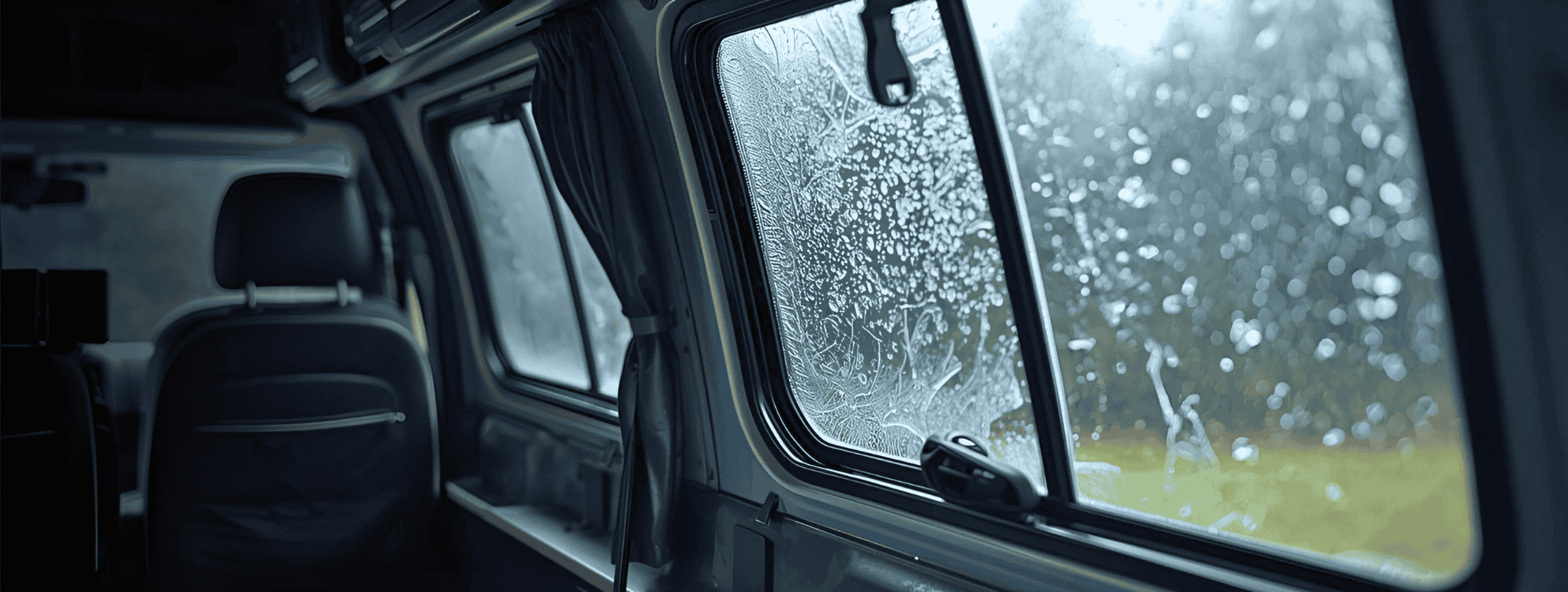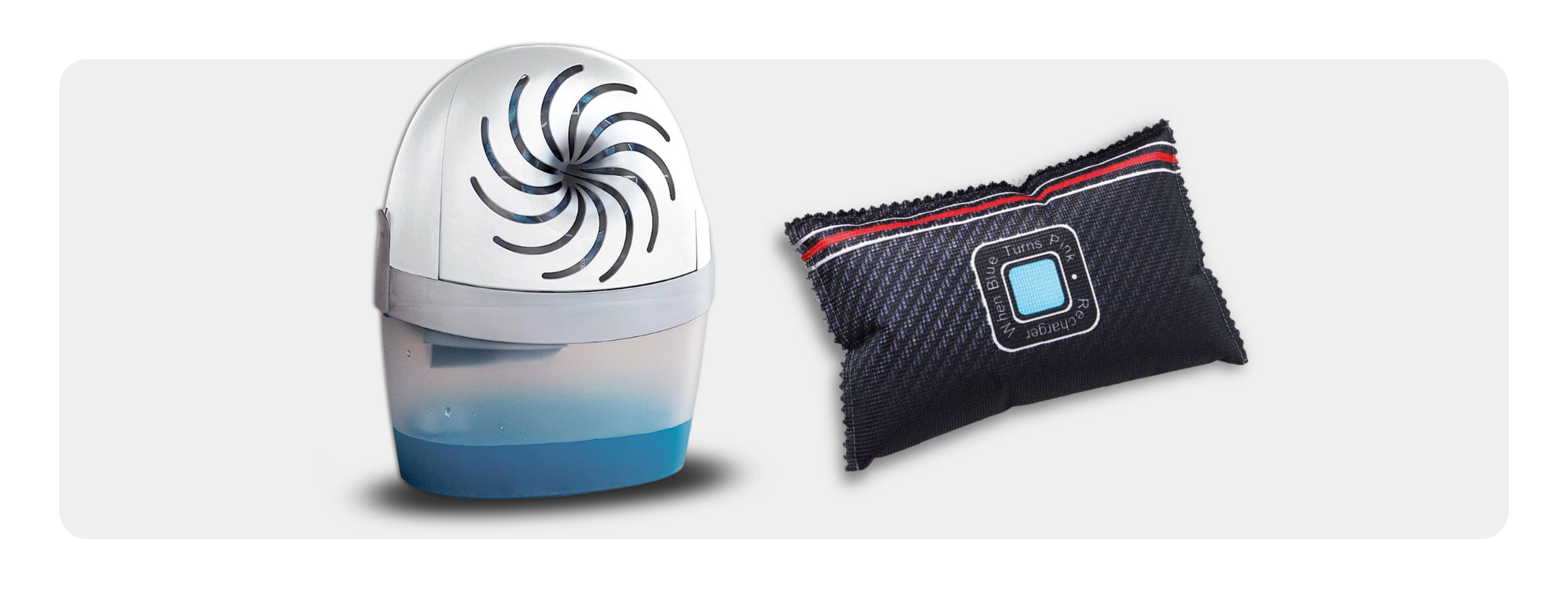Condensation is one of the most common and frustrating issues campervan owners face, especially during the winter months. But here’s the good news. Once you understand what causes condensation in a campervan, you can take simple steps to reduce it.
What Causes Condensation in a Campervan?
Condensation happens when warm, moist air hits a cold surface. It’s as simple as that.
In a campervan, this happens all the time as you’re in a small, enclosed space where the following contribute:
- Breathing and body heat: Two people sleeping in a campervan are said produce over a litre of moisture overnight. This is based on the theory that each person exhales and sweats out around 0.5 to 1 litre of water per day1, and a lot of that is released during sleep. In a small, poorly ventilated campervan, this moisture has nowhere to go, so it condenses on cold surfaces.
- Cooking and boiling water: Steam from kettles, pans, and even toasting bread adds to humidity levels, fast.
- Wet clothes and towels: When you’ve taken a shower or a walk in the rain, you have to hang your clothes/towels somewhere to dry, but that moisture must go somewhere.
- Lack of ventilation: If moisture filled air can’t escape your campervan, it builds up.
- Cold weather: The bigger the difference between inside and outside temperatures, the more condensation you’ll get.
All of that adds moisture to the air. And when that warm air touches cold windows or metal panels, it quickly turns into water droplets.

The effects of condensation in a campervan
A little mist on the windows might not seem like a big deal. But over time, condensation buildup can cause serious problems, if you’re not careful.
Physical Damage to your campervan
Over time mould and mildew can build up in damp corners and hidden spaces and cause a musty smell in your van. Rust and corrosion can appear on metal frames, window seals, and under the seating/beds. Cabinets, floors, and wall panels may eventually rot if damp is left untreated.
Health Risks
Condensation isn’t just a nuisance, it can affect your health, especially through long-term exposure.
Damp air is a breeding ground for airborne irritants. It holds allergens, dust mites, and mould spores. According to the GOV.UK, exposure to damp and mould can cause:
- Wheezing and coughing
- Shortness of breath
- Increased sensitivity in people with asthma or allergies
Mould thrives in damp, enclosed spaces, exactly the kind of environment condensation creates. It is likely to grow behind panels, under mattresses, and in corners you rarely check. Once it grows, it releases spores into the air.
The Government website also says that mould exposure is linked to:
- Irritation of the eyes, nose, and throat
- Skin reactions
- Chronic respiratory inflammation with prolonged exposure
You might not notice mould right away. But if your van smells musty or you wake up feeling congested, it’s worth checking to see if you even have it. Black mould often forms around windowsills, air vents, soft furnishings and even your fridge, especially in winter.
How to reduce condensation in a campervan
You can’t stop moisture and condensation completely, but you can manage it. Here’s how.
Improve ventilation
One of the easiest things you can do to reduce condensation is to get some air circulating around your van.
- Open a roof vent (if you have one): Even in winter, a cracked roof vent can help.
- Open windows: A small opening on opposite sides of the vehicle can create airflow.
Control moisture at the source
Try and reduce the amount of moisture you produce while you’re in your campervan, from the get-go.
- Cook with lids on: If you need to cook indoors, this will produce less steam, and therefore less moisture.
- Dry clothes outside: Leave wet items in your awning.
- Wipe down surfaces: Especially windows in the morning.
Use Moisture Absorbers
While there is some debate about the effectiveness of moisture absorbers in combating condensation in a campervan, you could try using the following:
- Dehumidifiers: Small 12V or rechargeable ones work well in vans.
Absorbent crystals: Cheap and easy to place in cupboards or corners.

Upgrade Your Insulation
Improving your insulation helps to make interior surfaces warmer, reducing the risk of condensation. Using a thermal screen cover can help, but there are further actions you can take.
Insulated wall and ceiling panels are essential in DIY conversions or older leisure vehicles with minimal factory insulation. These panels can help to maintain a warmer interior temperature which can reduce cold spots that attract condensation. Materials with a high R-value and foil-backed options are good for reflecting heat back into your van.
Cold rising from the floor can also contribute to heat loss and surface cooling. Adding insulated underlay or foam-backed vinyl can make the flooring feel warmer underfoot and reduce the chance of condensation forming beneath furniture or storage boxes. You could also consider taking a rug with you during the winter months.

Protect your winter campervan adventures
At Lifesure, we’ve been arranging insurance for campervans in the UK for over 40 years, so we know a thing or two about what you’re looking for in your policy.
We can arrange campervan insurance to cover a variety of perils from personal belongings to lost keys. With us, we want you to adventure with confidence, knowing you have cover for the things that matter to you.
Our award-winning agents are always happy to help. Call them on 01480 402 460 for a new quote or to help with any changes to an existing policy.
FAQs: What People Ask Most
Please note that these Frequently Asked Questions are not a substitute for the policy wording. For full terms and conditions please see the policy documentation.
What causes condensation in a campervan?
Warm, moist air hitting cold surfaces. It’s usually from breathing, cooking, or drying things inside.
Is condensation in a campervan dangerous?
It can be. Over time, it leads to mould, rust, and health issues if not managed.
How do I stop condensation overnight?
Ventilate while you sleep. Use thermal blinds. Wipe down windows in the morning.
What’s the best dehumidifier for a campervan?
Look for compact, low-power models. Rechargeable or 12V options are ideal.
Can insulation reduce condensation?
Yes. Insulation keeps surfaces warmer, which helps prevent moisture from forming.
1. Source: Common activities that create moisture - South Tyneside Council
Disclaimer: The sole purpose of this article is to provide guidance on the issues covered. This article is not intended to give legal advice, and, accordingly, it should not be relied upon. It should not be regarded as a comprehensive statement of the law and/or market practice in this area. We make no claims as to the completeness or accuracy of the information contained herein or in the links which were live at the date of publication. You should not act upon (or should refrain from acting upon) information in this publication without first seeking specific legal and/or specialist advice. Arthur J. Gallagher Insurance Brokers Limited trading as Lifesure accepts no liability for any inaccuracy, omission or mistake in this publication, nor will we be responsible for any loss which may be suffered as a result of any person relying on the information contained herein.
FP1694-2025 |











